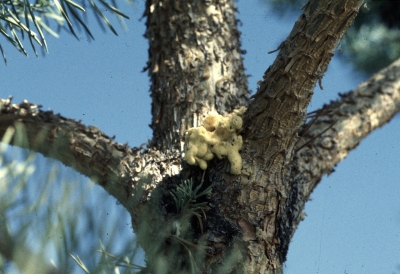Ruining more than Christmas: The Zimmerman pine moth
 Zimmerman Pine Moth Infestation
Zimmerman Pine Moth Infestation
Left untreated, a Zimmerman pine moth infestation can easily destroy a Christmas tree farm’s entire crop. But they aren’t partial to just crop pines. The insect is also responsible for forest devastation. The moth’s favorite host is the Austrian pine, but they have also been found in Scotch and ponderosa pines. Their natural behavior results in weakened branches and damaged bark, leaving trees susceptible to further damage by strong winds and heavy rain or snowfall.
Zimmerman pine moths have natural enemies, but conditions that are perfect for a moth explosion – climate changes that weaken trees – are disastrous for the animals that eat them. In many parts of the United States, Zimmerman pine moths outnumber their natural enemies 1,000 to one.
Zimmerman Pine Moth Description and Life Cycle
Just over a half inch long with a wingspan of one and half inches, the Zimmerman pine moth is a night-flyer with mottled gray forewings that feature brown and red zigzag markings. Their hindwings are yellowish white.
Spending their entire life cycle near their host tree, Zimmerman pine moths seem to have very little purpose other than to reproduce. Within two weeks from emerging from a silk cocoon in late July, the moths have mated and the female has laid about 40 eggs on the bark of a pine tree. The “nest” is a golf ball-size mass of pitch that looks like popped popcorn in the crotch of a branch or on the trunk of the tree.
The eggs hatch in about a week and the larvae feed and then tunnel into the tree to overwinter. In early spring white, light pink or green caterpillars emerge from the pitch and seek a new section of the tree to once again tunnel into and feed. In early July, they create a silk cocoon within the pitch and pupate. Adults emerge and the cycle begins all over again.
If you suspect a Zimmerman pine moth infestation on your property, contact SprayTech, Colorado commercial and residential weed and tree spraying specialists, at 720-248-0000 to discuss treatment options.


Comments are closed.